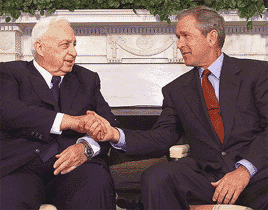Gideon Samet
This round in Washington is going to end nearly like all the previous ones. A summary can be typed ahead of time. A little hint of dispute, and a lot of public understanding between the Israeli and American leaders. There’s always some punch line by a spinner, whether local or distant. This time it is: “There’s no separation fence between Bush and Sharon.” Hats off to the creative flack.

But walls aren’t built with blurring and babbling. The visits this week could have been a turning point if President Bush wanted one. It didn’t happen, and it is very possible that there won’t be as good an opportunity that was missed in the foreseeable future.
If Bush had wanted, he would have demanded disciplined behavior from both sides according to a detailed timetable. If he wanted, he wouldn’t have swept the matter of the outposts, one of the veteran issues on which the administration has been vehemently critical of Israel, under the rug. Of all the burning issues, Bush chose the fence. And for that he received a typical Sharon response and possibly showed that he still hasn’t learned to deal with Sharon.
Sharon promised not to build - for now - in problematic areas. Mr. President, you made Sharon laugh. That’s how he’s been deceiving people for decades, like the way he deceived a charismatic prime minister on Lebanon. Sharon will come home completely happy: No outpost removal, no tangible pressure to improve the lives of the Palestinians. In fact, nothing.
Bush may have read Robert Frost’s famous poem, Mending Wall: “Before I built a wall I’d ask to know / What I was walling in or walling out, / And to whom I was like to give offense. / Something there is that doesn’t love a wall, / That wants it down.” Robert Kennedy knew how to use those lines against the Berlin Wall. Bush has taken a hold of the wall to be free of the critical mission to vigorously energize his personal vision in all its aspects.

It’s a bitter evasion precisely because after all the lengthy administration efforts, such a poor result from a week of meeting the leaders in the front yard only thickens the smell of expected failure. An important reason for it is that all the parties involved - except to a well-known extent, Abu Mazen - have not spoken directly to the point. They babbled, mostly for domestic and international political needs.
But meanwhile, in Jerusalem, a not insignificant force is gathering steam against any initiative. Transport Minister Avigdor Lieberman has announced he isn’t even thinking of quitting the government. Building roads throughout the land, he announced with his permanent tone of scorn, is more important than the road map.
But what’s holding him is not simply a chair but the assessment that those occasions when the right won an almost tie is a substantial achievement. Seven out of 14 Likud ministers oppose the process, 24 out of 40 MKs - and of course the rest of the right’s ministers. They will continue bombing the road map without drawing any conclusions.
With those who support the process stuttering, and those who hate it playing requiems to it, Shinui is the only moderate force now in the government, ironically becoming its leftist pole. Tommy Lapid comes across now as someone from whom one can expect more dramatic rhetoric, which he knows how to produce, against killing off the process.
Ruby Rivlin is a characteristically typical case of the opposite. With a torn heart, the former speaker of the Knesset announced he will not agree to a Palestinian state and the road map is leading to terrible districts. Why, instead of that whining blather, doesn’t he resign as he threatened to do if the government signed onto an agreement to a Palestinian state? After all, Sharon has accepted one in principle.
Why? Because the scent of victory is rising in the nostrils of those who would sabotage the process, so they plead the right to babble on while gaining time. Just like the prime minister, talking about his commitment to the Bush vision and doing nothing to fortify it, they assume - quite correctly - that the initiative won’t last long at the current pace of implementation.
After what appears to be the illusion of determination on Washington’s part, it is very possible that their hope will be realized. Appeals to the president from every direction, including yesterday’s New York Times, have not helped. Those who are counting backward to the demise of the process will be responsible for another countdown - to the return of the intifada at the end of the delicate cease-fire.
Gideon Samet is a senior editorial member of Haaretz, Israel’s leading daily newspaper.
Courtesy of the Tel-Aviv based Haaretz newspaper.